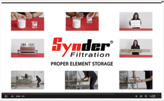Corn Wet Milling
For the past thirty years, membrane filtration technology has been used throughout many stages of corn wet milling. As opposed to conventional methods such as centrifugation, membranes are able to save manufacturers in operational and discharge costs.
During corn wet milling process, the corn kernels are first steeped for 24-36 hrs. The resulting steepwater can be fractionated into two streams by membrane technology – the concentrate stream would contain most of the long chain proteins (10-15% of the total solids) that is ideal for gluten meal, and the permeate stream which can be concentrated further and used as an additive to fermentation processes. Membrane filtration can also be used to clarify mud, the by-product of the conversion of starch to corn syrup, to produce a clear permeate stream ready for concentration.
Benefits of membrane process:
- Reduced operating and discharge costs
- High efficiency throughout the corn wet milling process with different types of filtration implemented
Recommended membrane:
ST, BN, LY, LX, and FRApplications
CASE STUDY
questions? Fill out this form. We’ll contact you within 24 hours!
Resources
MEMBRANE RESOURCES
- Definition of a Membrane
- Membrane Materials: Organic vs. Inorganic
- Pressure-Driven Membrane Filtration Processes
- Concentration Polarization in Pressure-Driven Processes
- Degrees of Membrane Separation
- Flux Behavior in Membrane Processes
Module Configurations & Processes
-> View all membrane resourcesTUTORIALS









